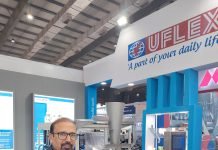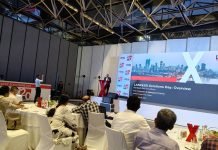Mumbai-based listed company TCPL Packaging, has strengthened its operational footprint with a new facility in Chennai, designed to support long-term growth. The site is built for scalability, allowing for future additions as demand rises. With more than 20 printing lines already in operation across its network of plants across India, TCPL Packaging expects Chennai to become a key contributor to revenue in the coming years.
Dedicated to paperboard carton production, the facility improves TCPL’s logistics and service capabilities, meeting the growing demand for sustainable packaging in Southern India. Marking a major milestone in the company’s long-term growth strategy, the inauguration ceremony of the new unit was held at the Trident in Chennai on 6 March 2025. Packaging South Asia took a tour of the plant on 7 March.
“The commissioning of our Chennai greenfield facility marks a key milestone in our growth journey. This expansion augments our ability to serve customers in a high-potential market while supporting our long-term vision for scalability and industry leadership,” Saket Kanoria, managing director, TCPL Packaging, said.

The Chennai plant has a variety of equipment in the pre-press, press and post-press departments with the 7-color plus coater combi press from Koenig & Bauer at the center of its operations. “The Chennai unit is a very vital addition. While the company’s future expansion in Chennai will depend on the facility’s initial performance, with extensive land available for further development, TCPL has the flexibility to explore new segments and scale up operations as required,” Akshay Kanoria, executive director, TCPL Packaging, told Packaging South Asia.
The current production area currently exceeds one lakh square feet, with the potential to add a similar-sized unit within a few months’ notice. Space constraints are not expected to hinder future expansion.
Standardized operations with local adaptations
Initially, the Chennai facility has replicated the machinery and product lines of TCPL’s other carton plants, maintaining the company’s standardized factory model. Over time, investments will be made to cater to specific local industry needs.
Akshay Kanoria said that previously TCPL Packaging was unable to seamlessly serve its customers’ southern operations. As such, TCPL’s Chennai facility enhances its role as a strategic partner. The expansion has also generated interest from new customers in the region, strengthening the company’s market presence, he added.
TCPL continues to diversify its product range, recently entering the pizza box packaging segment. “The technology required aligns with our expertise in folding cartons. Partnering with VENTiT has enabled this move without additional manufacturing investment,” Akshay Kanoria notes. In the near term, the Chennai plant will produce ventilated pizza boxes, with machinery already in place and production set to soon commence. He adds that while TCPL has yet to introduce rigid box production, it remains a long-term goal.
Optimistic about Indian growth

Saket Kanoria remains optimistic about India’s packaging industry despite global economic volatility. With inflation, fluctuating commodity prices, and geopolitical tensions affecting supply chains, he outlines TCPL’s strategies for navigating these challenges.
While India’s economy remains resilient, Kanoria acknowledges an evolving demand pattern in the packaging sector. “The growth rate has moderated from double digits to low single digits. Supply chain capacity is expanding faster, adding pressure,” he notes. However, despite inflationary pressures in agricultural commodity industries, overall consumer spending remains stable, with adjusted purchasing patterns.
Chennai plant – a gateway for exports
TCPL’s Chennai plant, located near the port, is well-placed to drive exports, including to Southeast Asia. “Shipping to Southeast Asia from Chennai is comparable in distance, time and cost to intra-SE Asian shipping, giving us a competitive edge,” Saket Kanoria notes.
While Southeast Asian manufacturers benefit from ASEAN trade bloc policies, Saket Kanoria asserts that India’s packaging industry remains competitive due to its broader product offerings. “The Indian sector is on a par with Southeast Asia in scale, although they export more. Their labor policies have historically provided an advantage, but India is catching up.”
Sectoral growth and strategic positioning
TCPL’s diverse client base across multiple industries has provided a buffer against sectoral downturns. “Some sectors perform well while others slow down, ensuring balanced growth. For instance, the liquor sector’s decartonization posed challenges, but demand from other industries offset its impact,” Akshay Kanoria says.
As India positions itself as a global manufacturing hub, TCPL remains focused on both domestic and export markets. “If India’s exports grow, we will actively participate. Our current export business is stable, and any manufacturing shift of end-user industries like electronics, textiles, toys, leather products, and others to India would be an advantage,” he adds.
On global trade dynamics, Akshay Kanoria remains pragmatic. “Shifting tariff structures create uncertainty, but protectionist policies have historically failed. Many importing nations, including the US, lack domestic capacity for specific products, ensuring long-term demand for cost-efficient suppliers like India.”










